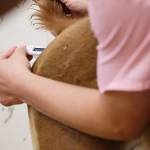Bacteria in Equine Microbiome Can Contribute to Antibiotic Resistance

Nurturing the intestinal microbiome of foals and horses offers important health benefits, including immunity to infection. That is, unless the bacteria that make up part of the microbiome contain genes that confer resistance to antibiotics. The intestinal microbiome may then make treating certain infections, such as pneumonia and diarrhea, challenging using standard antibiotic protocols.
Certain bacteria can manifest genes that make them resistant to specific antibiotics. This has been reported in foals treated for pneumonia caused by Rhodococcus equi, for instance. Newborn foals that have not been sick or have not been treated with antibiotics theoretically should not have bacteria in their microbiome that possess these resistance genes. Researchers recently discovered that foals can harbor resistance genes in their intestinal microbiome.*
“The microbiome of foals becomes established when they are born and exposed to bacteria from the mare’s vagina, perineum, milk, and environment. Foals also practice coprophagia and ingest bacteria from the manure of adult horses that help establish their own microbiome,” explained Rebecca Ham, a nutrition advisor with Kentucky Equine Research. Thus, if the dam or other adult horses in the foal’s community have bacteria with resistance genes, these can be easily passed to the growing foal early in life.
Analysis of fecal samples collected from foals less than 30 days of age confirmed the ease with which antibiotic resistant bacteria can become established in the intestinal microbiome. In that study, a total of 10 different types of antibiotic resistance genes were identified in 81% of the foals sampled. Tetracycline resistance genes were the most common.
Of additional concern, bacteria in the microbiome that possess antimicrobial resistance genes can donate these genes to other bacteria in their environment. A few bacteria with resistance genes can actually make the entire microbiome resistant to specific antibiotics.
“This threat of antibiotic resistance indicates certain antibiotics may eventually be ineffective. As such, foals and older horses could be at risk of developing diarrhea, for example, that we will be unable to treat with antibiotics,” said Ham. “Fortunately, few of the antibiotic resistance genes identified in the study were deemed clinically significant. However, more research into this phenomenon is required.”
Supporting the stability of the intestinal microbiome should always be a priority for horse owners, especially in the face of factors known to cause stress, such as weaning, exercise, transport, and dietary changes. In addition to adequate forage intake, EquiShure and other hindgut buffers stabilize the pH in the cecum and large colon to ensure the microbiome remains constant. This is important for optimal hindgut function, feed utilization efficiency, immunity, and protecting the horse from the consequences of microbial imbalance.
*Liu, Y., K.E. Bailey, M. Dyall-Smith, M.S. Marenda, L.Y. Hardefeldt, G.F. Browning, J.R. Gilkerson, and H. Billman-Jacobe. 2020. Faecal microbiota and antimicrobial resistance gene profiles of healthy foals. Equine Veterinary Journal. doi:10.111/evj.13366








